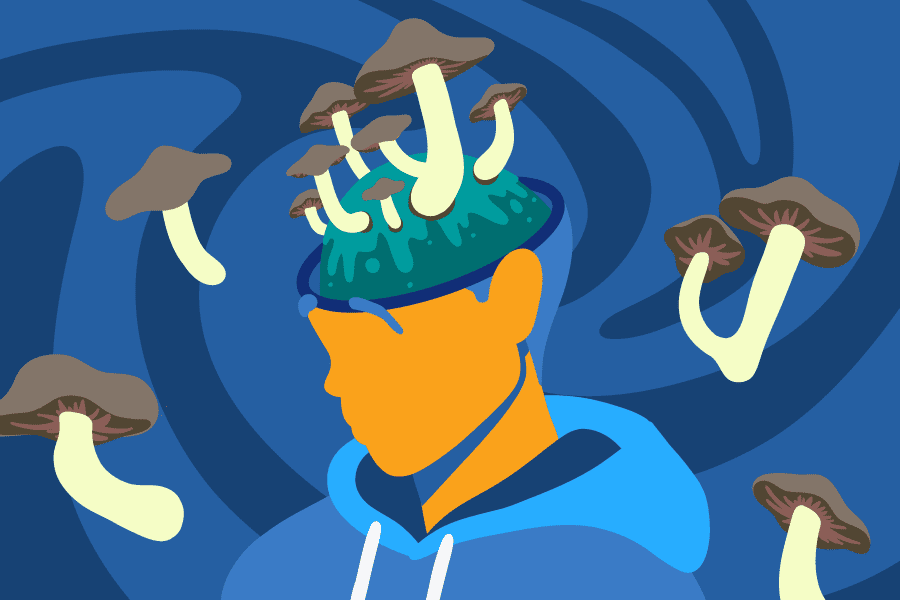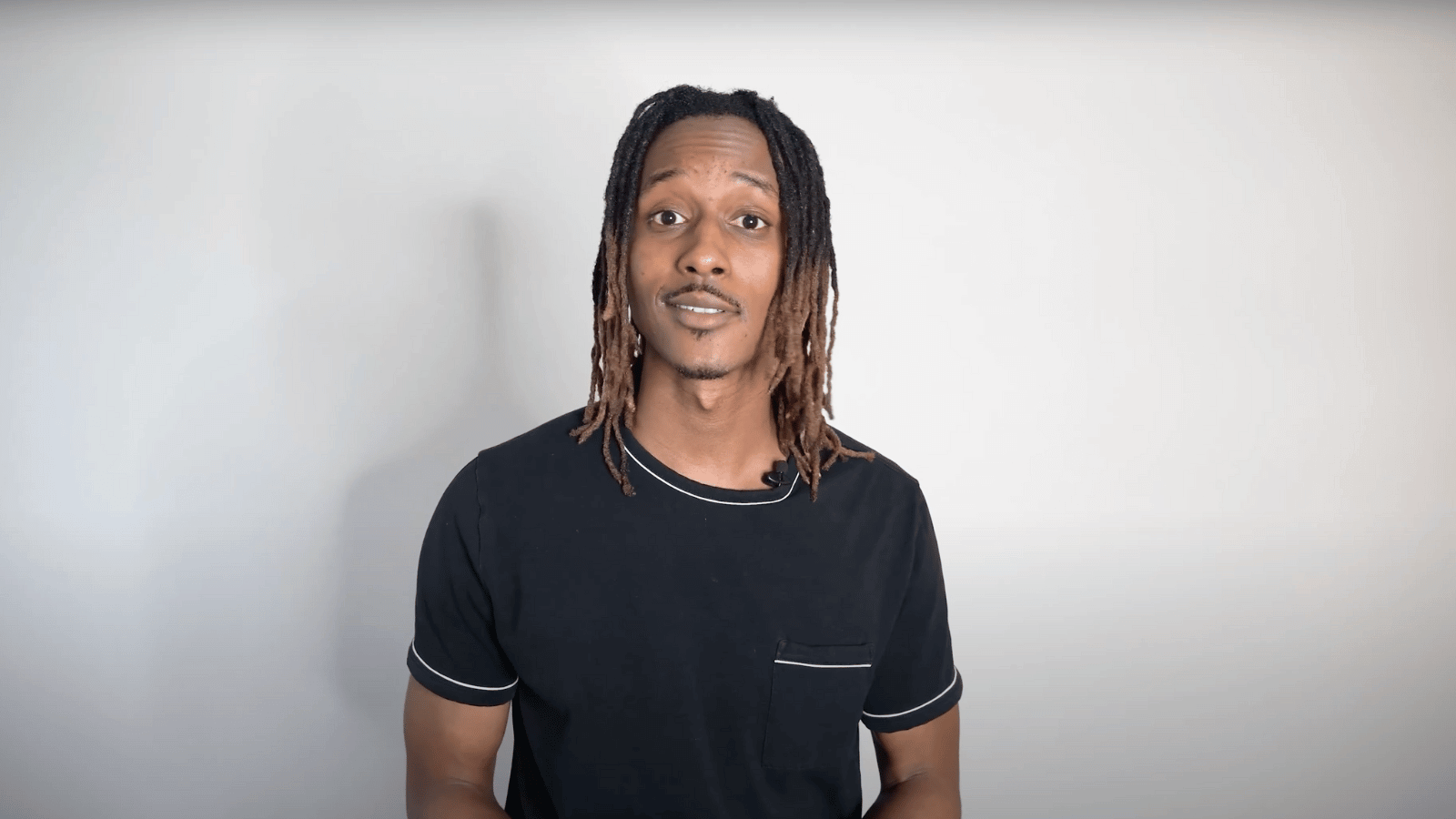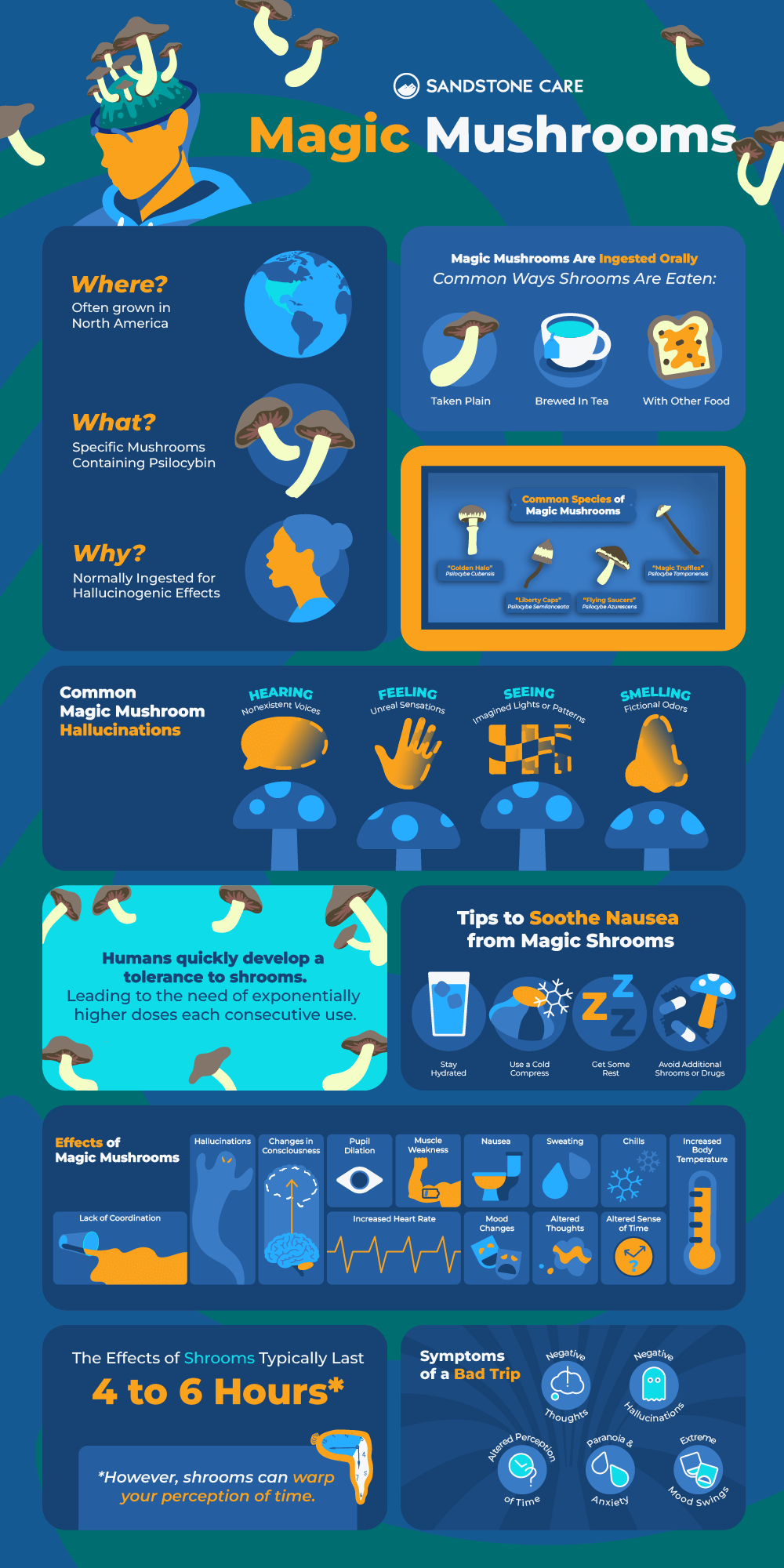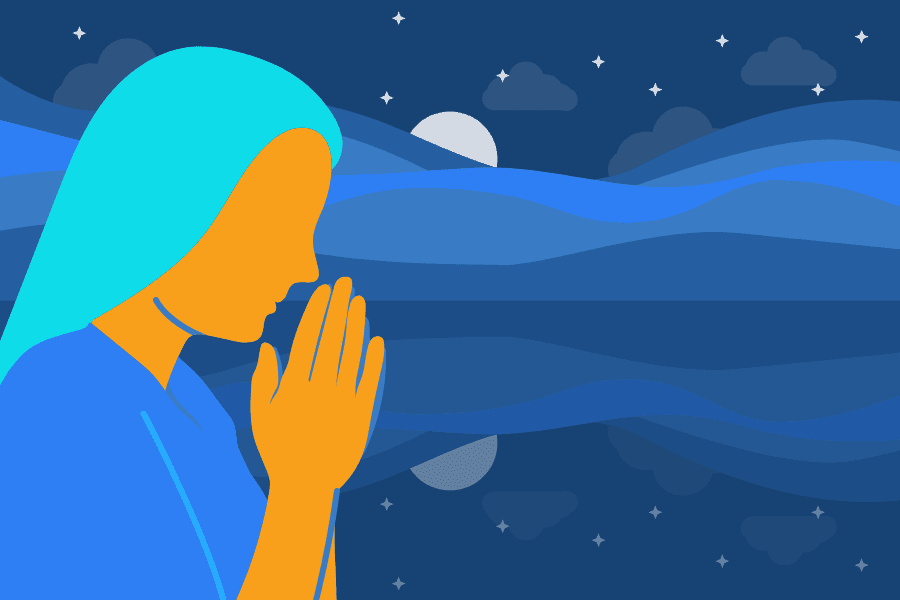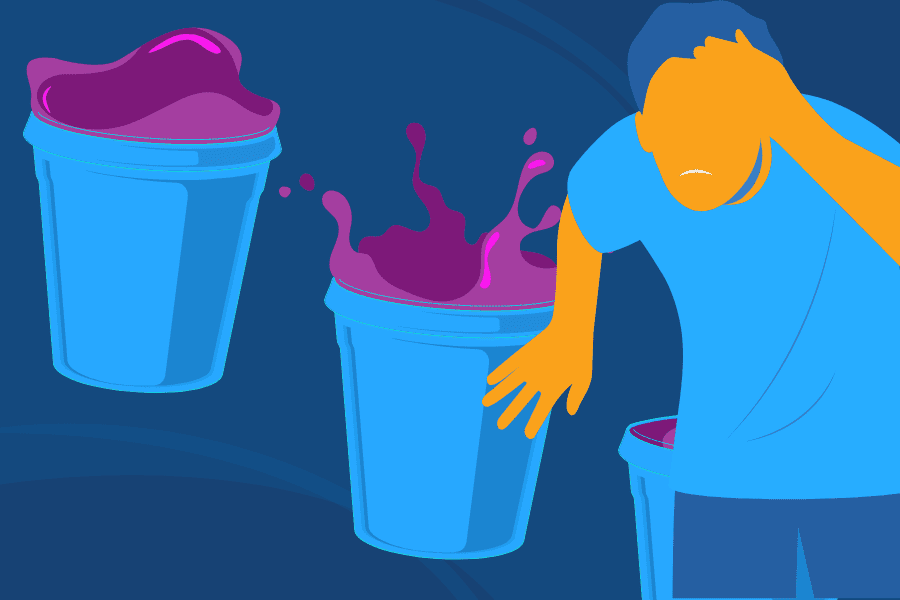Magic Mushroom Overview
What Are Magic Mushrooms?
Psilocybin mushrooms, also known as magic mushrooms, are found in Mexico, Central America, and the United States.
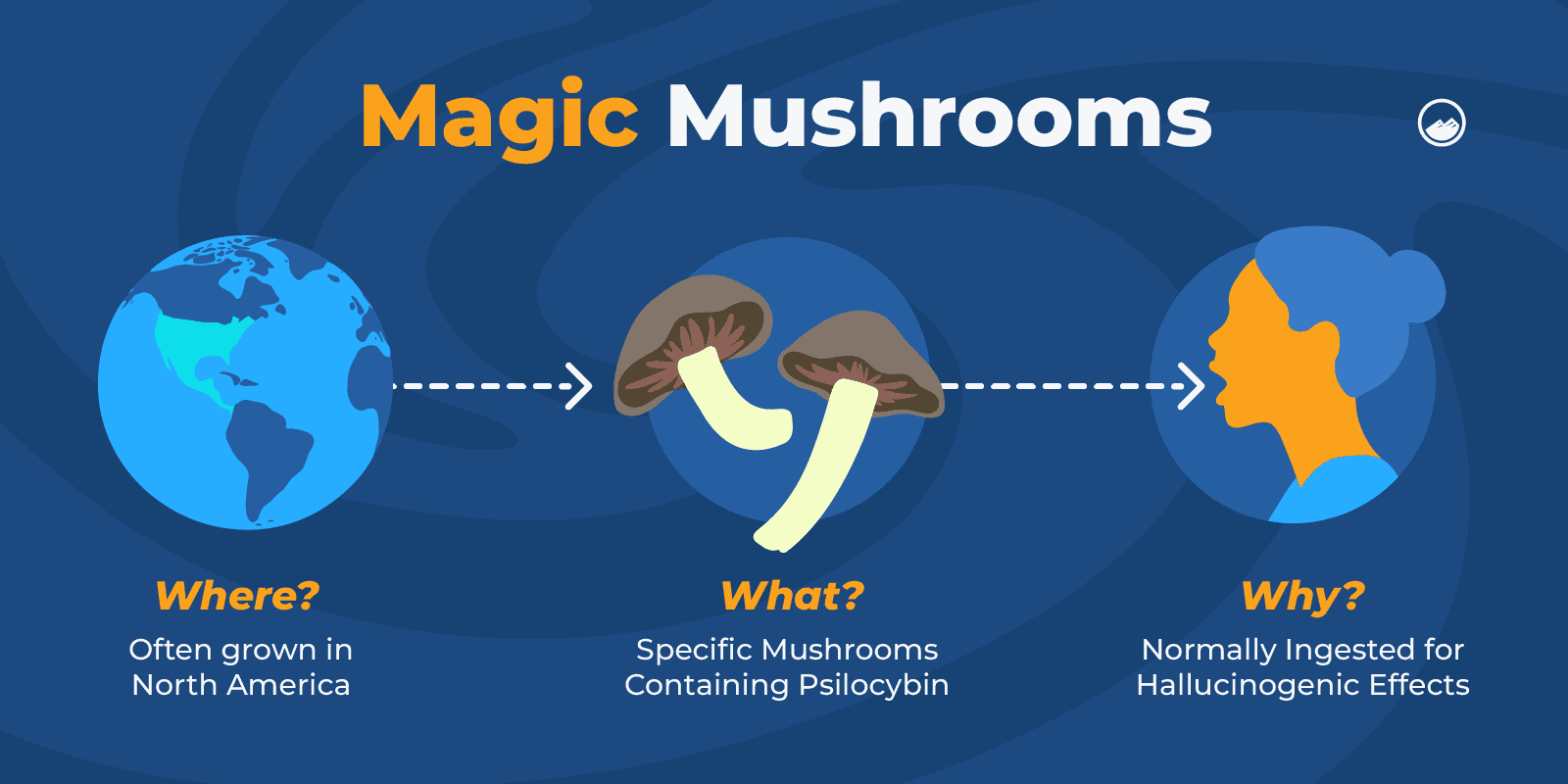
Psilocybin refers to a chemical that is obtained from specific types of fresh or dried mushrooms, according to the DEA.
Individuals may ingest magic mushrooms for their hallucinogenic effects. They can make a person experience hallucinations, alter their perceptions, and are often consumed for an introspective or spiritual experience.
Magic mushrooms are currently illegal. However, more states have recently been moving towards decriminalizing the use of psilocybin.
Research is being done to determine the potential use of magic mushrooms in therapy. However, much remains unknown, and further knowledge is needed.
Psilocybin is generally more abused by the teen and young adult population who use it in settings like raves, clubs, and even college campuses.
Individuals need to know, especially young people, the possible effects and risks of magic mushrooms. Shroom use is often unpredictable and can lead to distortions and “bad trips,” among many other negative and potentially harmful experiences.
What Do Psilocybin Mushrooms Look Like?
Psilocybin mushrooms typically have long, skinny stems with caps that have dark gills on the underside.
When fresh, their stems are usually white or white-gray, and their caps are light and dark brown.
Dried mushrooms are typically a rusty color, with some areas colored off-white.
What Are Other Street Names For Psilocybin?
Other street names for psilocybin and psilocybin mushrooms include:
- Magic mushrooms
- Mushrooms
- Shrooms
- Caps
- Boomers
What Are the Different Types of Magic Mushrooms?
There are various types of mushrooms. Some of the most common ones include:
- Psilocybe cubensis
- Psilocybe semilanceata (liberty caps)
- Psilocybe azurescens (flying saucer mushrooms)
- Psilocybe tampanensis (magic truffles)
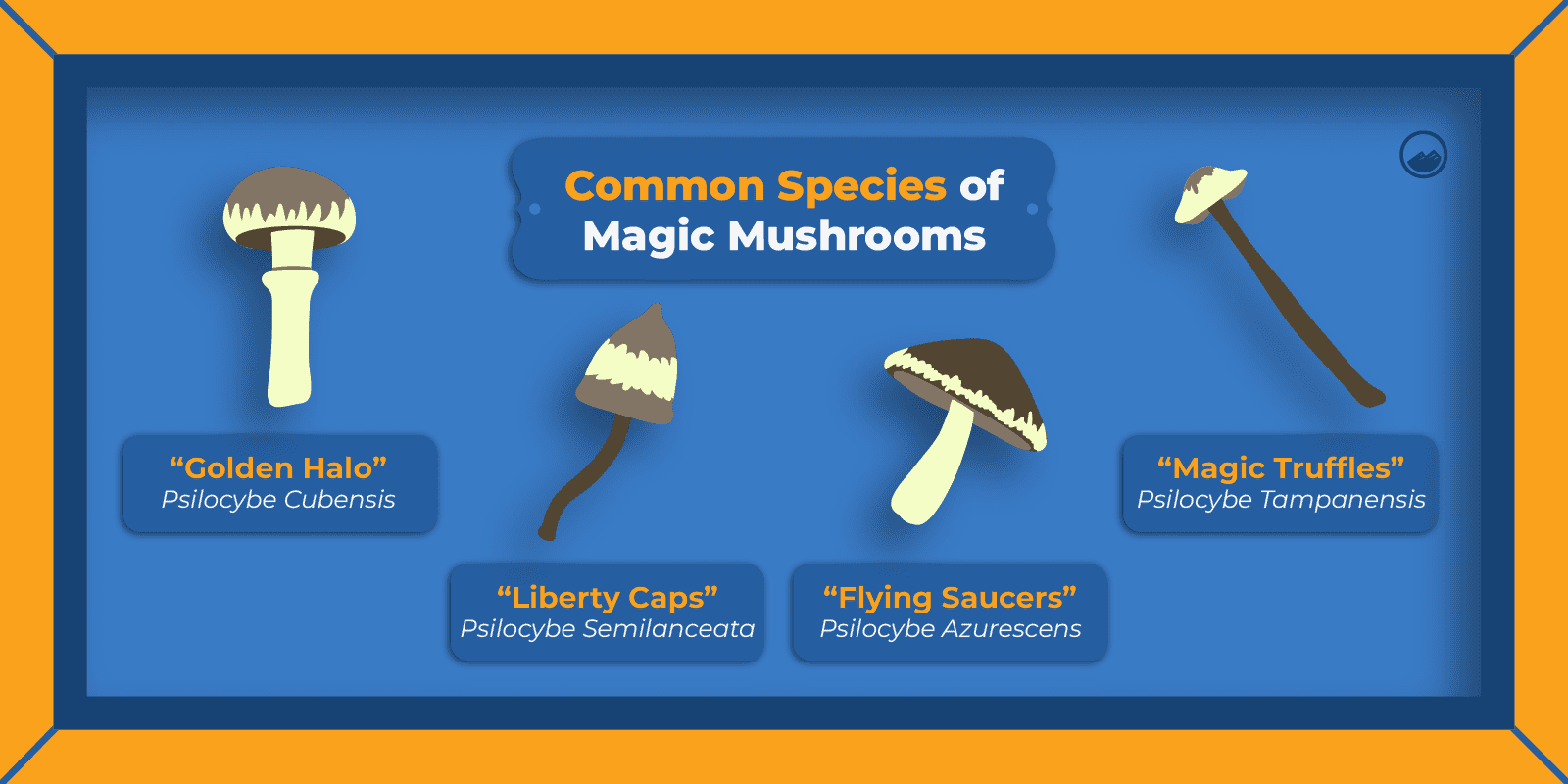
What Are Other Types of Psychedelics?
Other types of psychedelics and hallucinogenic drugs include:
Why Are Shrooms Illegal?
Psilocybin is named a Schedule I drug according to the Controlled Substances Act.
Schedule I drugs, like psilocybin, have a high potential for abuse and serve no legitimate medical purpose in the United States.
Other Schedule I drugs include both LSD and heroin.
Magic Mushroom Uses
How Do You Take Magic Mushrooms?
Magic mushrooms are ingested orally.
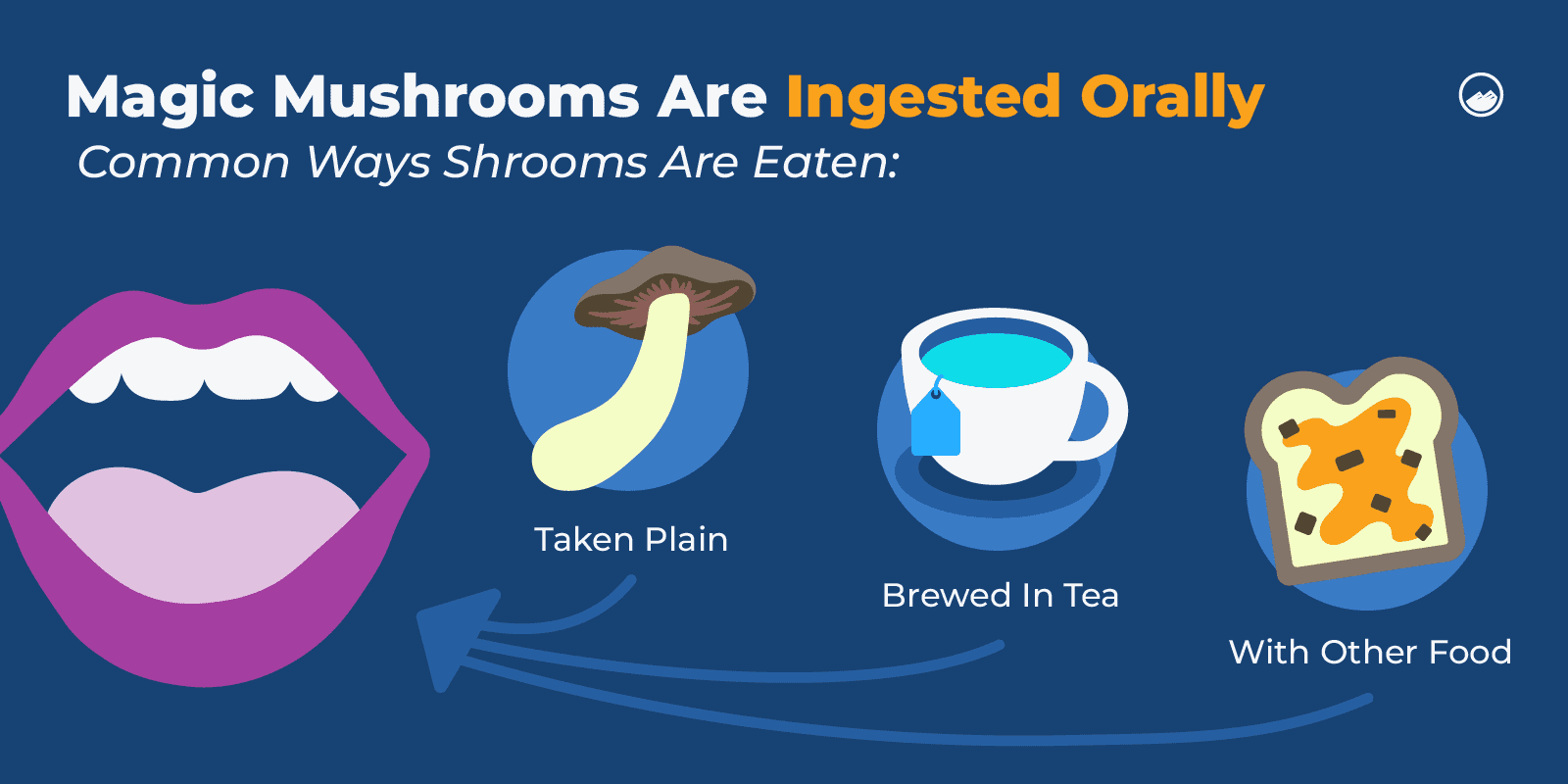
Some people brew them as tea or eat them with other foods to hide their bitter flavor. Individuals commonly ingest hallucinogenic mushrooms with chocolate to mask the flavor.
After a person ingests magic mushrooms, the body breaks down the psilocybin to produce psilocyn.
What Are Psychedelic Mushrooms Good For?
Psychedelic mushrooms are used for their hallucinogenic effects. They can affect a person’s senses, thinking, emotions, and perception of time and space.
Some studies examine the therapeutic potential of psilocybin for certain conditions, such as neuropsychiatry-related conditions.
What Are Psychedelics Doing to the Brain?
Psychedelics’ main effects occur in the prefrontal cortex region of the brain.
This region of the brain plays an important role in functions such as mood, cognition, and perception. Psychedelics can also cause flashbacks and altered memories.
Psilocybin also acts on the brain neurotransmitter serotonin. Serotonin can influence mood, learning, cognition, reward, and sleep, among many other important processes.
What Is the Most Common Type of Hallucination?
According to MedlinePlus, the most common type of hallucination involves hearing voices when no one has spoken.
Other types of hallucinations can involve feeling sensations on the body, seeing patterns or lights that are not there, or smelling an odor that nobody else can smell.
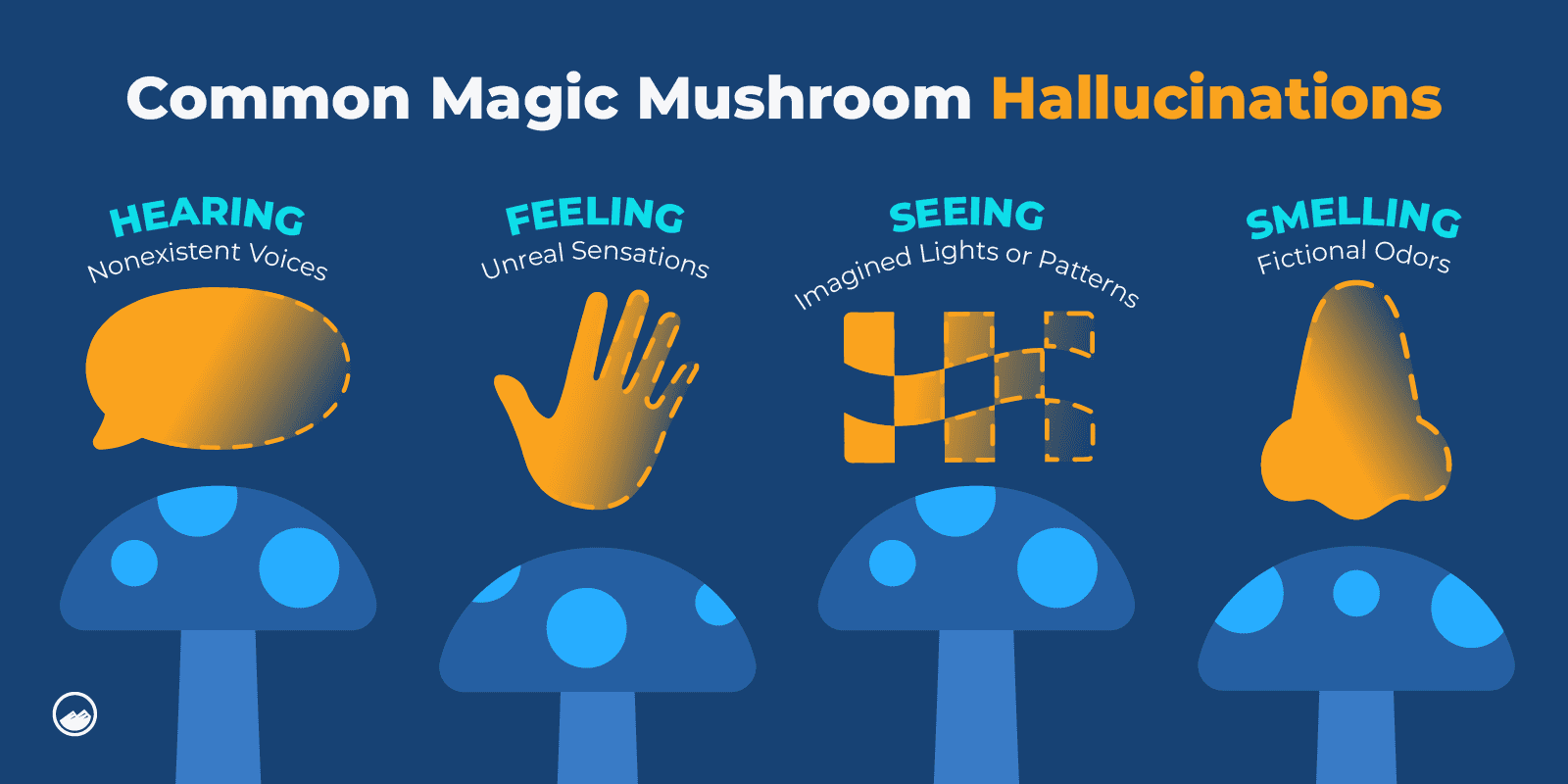
Do Psychedelics Change Brain Structure?
A 2018 study done by Cell Reports supports the hypothesis that psychedelics cause structural and functional changes in cortical neurons.
Cortical neurons refer to neurons found in the cerebral cortex, which plays an important role in attention, memory, awareness, and consciousness.
Long-term use of any substance, including psychedelics, can put a user at risk of long-lasting changes in their brain and body.
Can You Mix Mushrooms With Other Illegal Drugs?
Mixing mushrooms with other illegal drugs can be extremely dangerous and puts individuals at a higher risk of experiencing a “bad trip,” which involves experiences of anxiety and paranoia and puts them at a higher risk of overdose.
Psilocybin can interact badly with other substances, such as stimulants and depressants.
Mixing mushrooms with other prescription drugs that act on serotonin, like antidepressants, can increase a person’s risk of developing serotonin syndrome. Serotonin syndrome occurs when a person’s body has too much serotonin, which can be potentially life-threatening.
Can You Take Mushrooms While Using Psychiatric Medications?
Some medications can potentially have a negative and dangerous interaction with magic mushrooms.
Your healthcare provider should be aware of any medications, supplements, or substances you may be taking, so they can provide medical advice and help reduce the risk interactions.
Magic Mushroom Addiction
Are Magic Mushrooms Addictive?
Magic mushrooms are not considered to be a highly addictive drug. However, they are still highly abused and can lead to dependence or tolerance.
While short-term use of magic mushrooms does not lead to addiction as heavily as other illicit drugs, it is very possible to develop a tolerance to shrooms after just a couple of uses.
When a person develops a tolerance, they need more and more of a drug to achieve the same desired effects, which can also put the person at risk of facing serious negative effects and put them at a higher risk of overdose.
What Are the Risks of Taking Mushrooms?
Many people who take mushrooms seek a positive and sometimes spiritual experience.
However, one risk of taking mushrooms is experiencing a “bad trip.” Bad trips can involve terrifying thoughts, anxiety, and feelings of fear.
Some people who take mushrooms also have a hard time determining what is reality and what is fantasy, which can lead them into dangerous situations.
Individuals may also experience negative side effects like nausea and paranoia. Other people can also develop a condition known as hallucinogen-persisting perception disorder (HPPD), which are reoccurrence of hallucinations that can occur long after ingesting a drug.
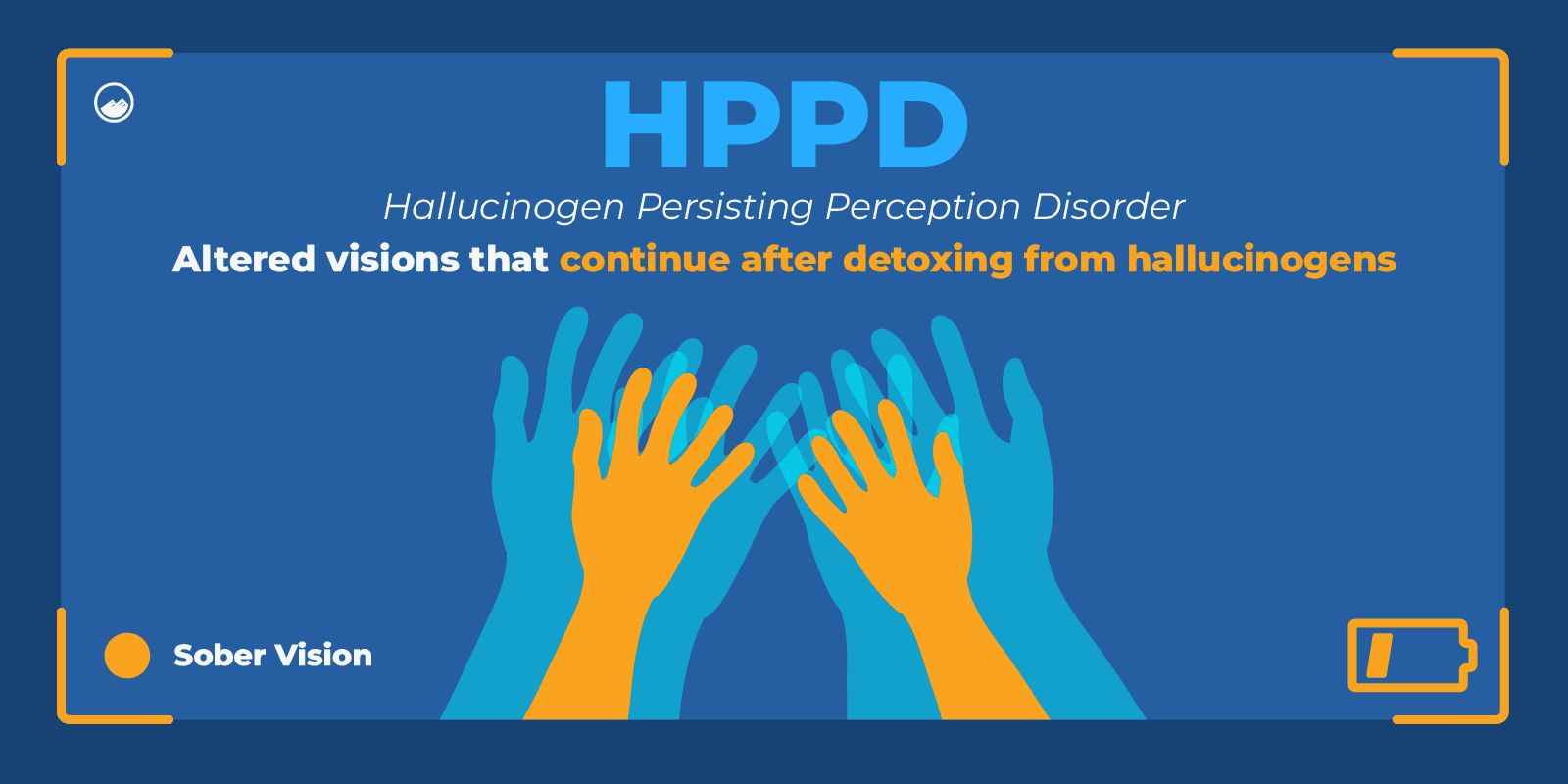
HPPD is a condition that is unique to psychedelic drugs, and the perceptual changes it causes can last up to weeks or months following the use of psychedelics.
There are also poisonous mushrooms that are toxic and can cause very dangerous effects, posing a significant risk for individuals who ingest shrooms.
Can You Develop a Tolerance of Shrooms?
Yes, a person can develop a tolerance to psilocybin mushrooms.
Drug tolerance occurs when the body gets used to a medicine or drug, so more of it is needed to achieve the same or desired effects.
The human body can quickly develop a tolerance to shrooms, which can cause a person to need much higher doses to achieve the same effects even after only a few days of repeated use.
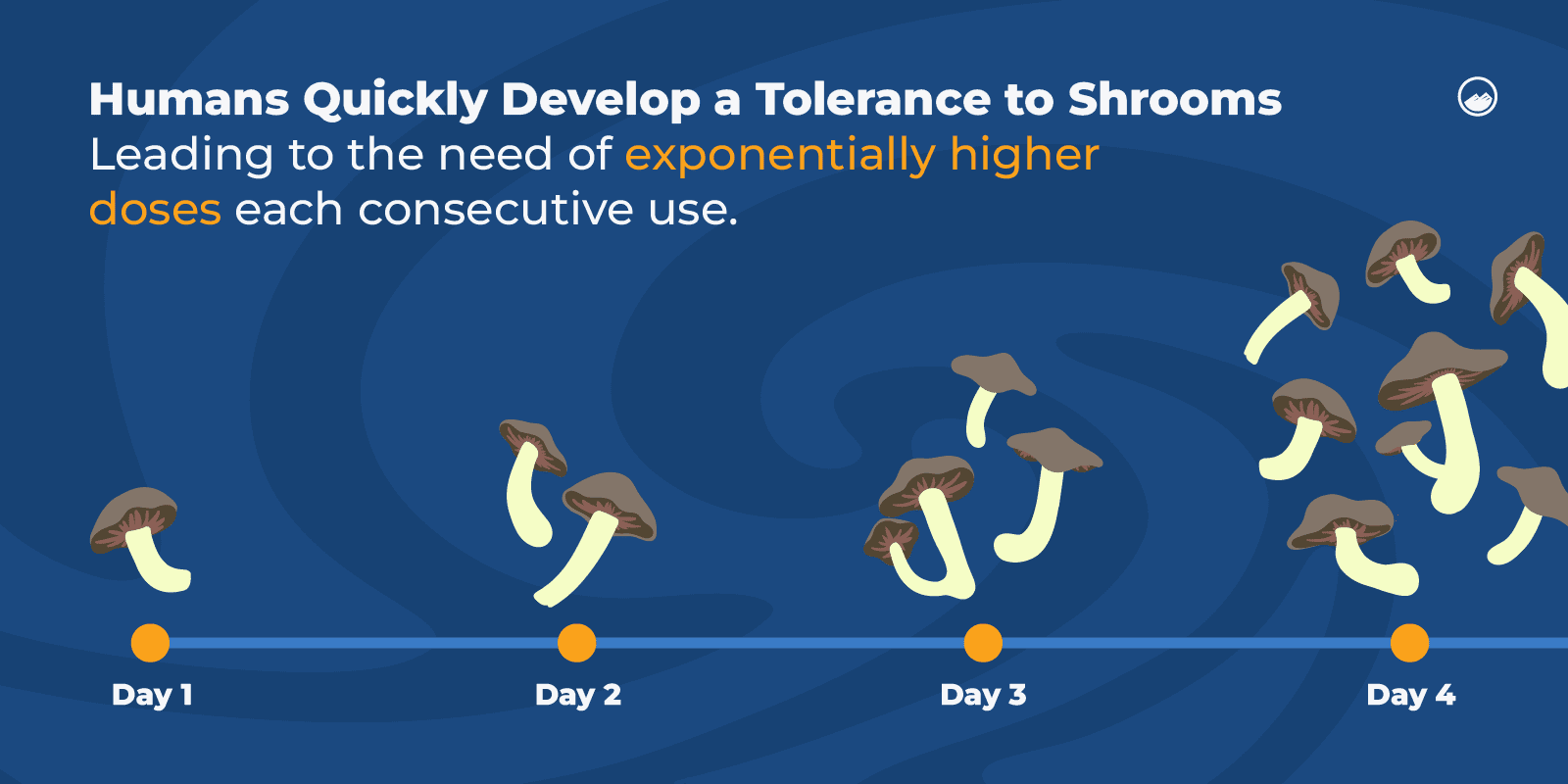
Can You Overdose on Psilocybin Mushrooms?
It is possible for a person to overdose on psilocybin mushrooms.
While not usually fatal, common symptoms of a psilocybin overdose can cause extreme distress and long-term health issues. If someone is experiencing an overdose and in danger, seek medical help or call 911.
Can You Experience Withdrawal Symptoms?
According to the 2017 Surgeon General Report, the withdrawal symptoms of mushrooms are unknown.
Withdrawal symptoms typically occur when a person develops a dependence on a drug.
Possible withdrawal symptoms that may come with mushroom use may include:
- Panic attacks
- Mood swings
- Difficulty understanding what is real and what is not
- Low impulse control
Magic Mushroom Symptoms
Are There Any Side Effects of Mushrooms?
The effects of mushrooms are commonly compared to those of mescaline and peyote.
Common physical effects and psychological side effects of mushrooms can include:
- Pupil dilation
- Muscle weakness
- Lack of coordination
- Hallucinations
- Nausea and vomiting
- Increased heartbeat and heart rate
- Increased body temperature
- Sweating
- Chills
- Changes in consciousness
- Mood changes
- Altered thoughts and perceptions
- Altered sense of time
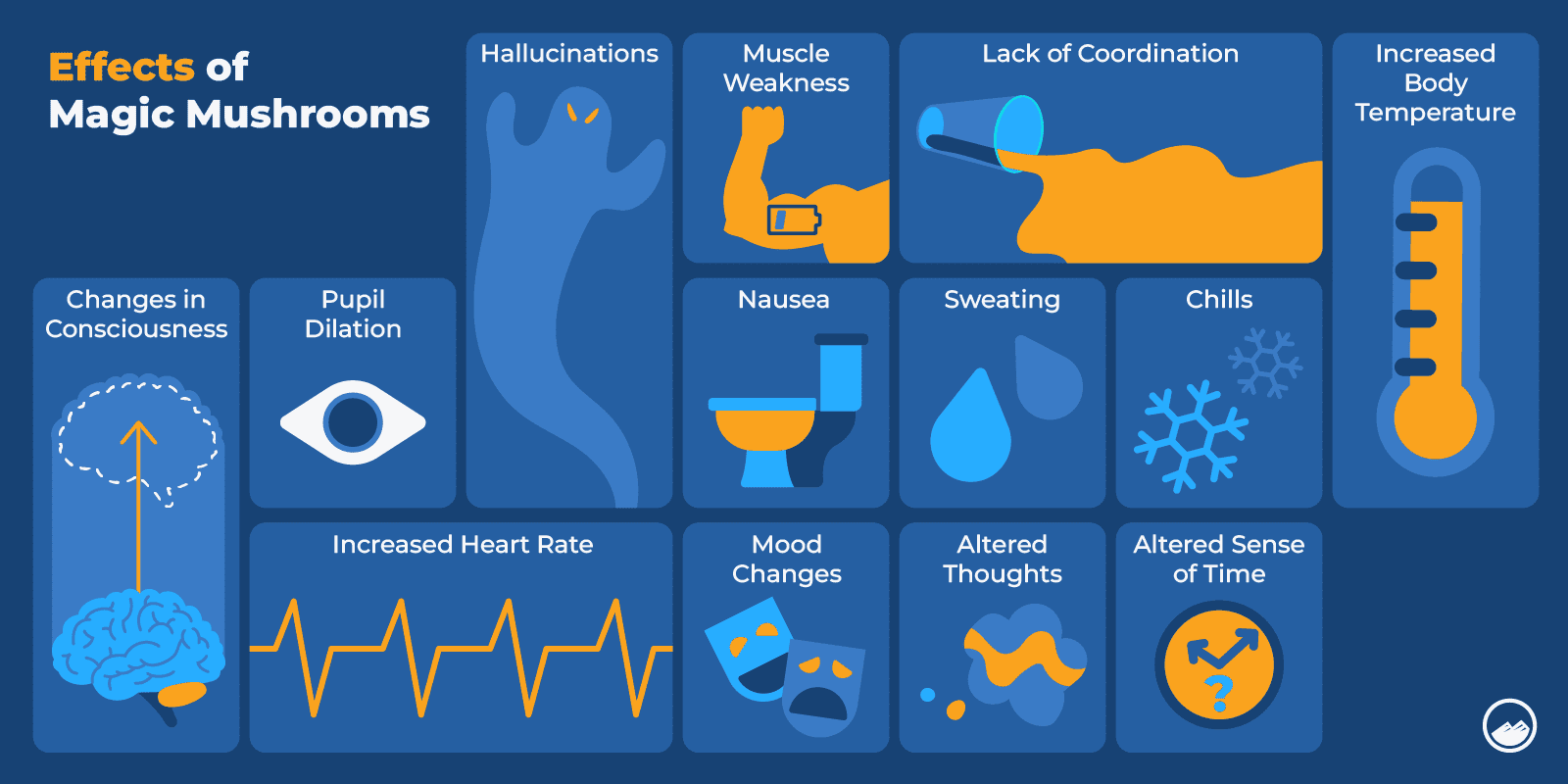
What Can Happen When You Take Psychedelics?
Taking psychedelics can be very unpredictable, and it can be hard to know what to expect.
Psychedelics can affect all people differently. However, psychedelics’ main effects are known to cause changes in a person’s consciousness and perception.
These effects commonly include visual hallucinations, sensory enhancement, the feeling that time is changing, objects can appear to be moving, and a person can experience unusual thoughts and speech.
The effects of psilocybin typically last around 4 to 6 hours and commonly peak around the 2nd or 3rd hour.
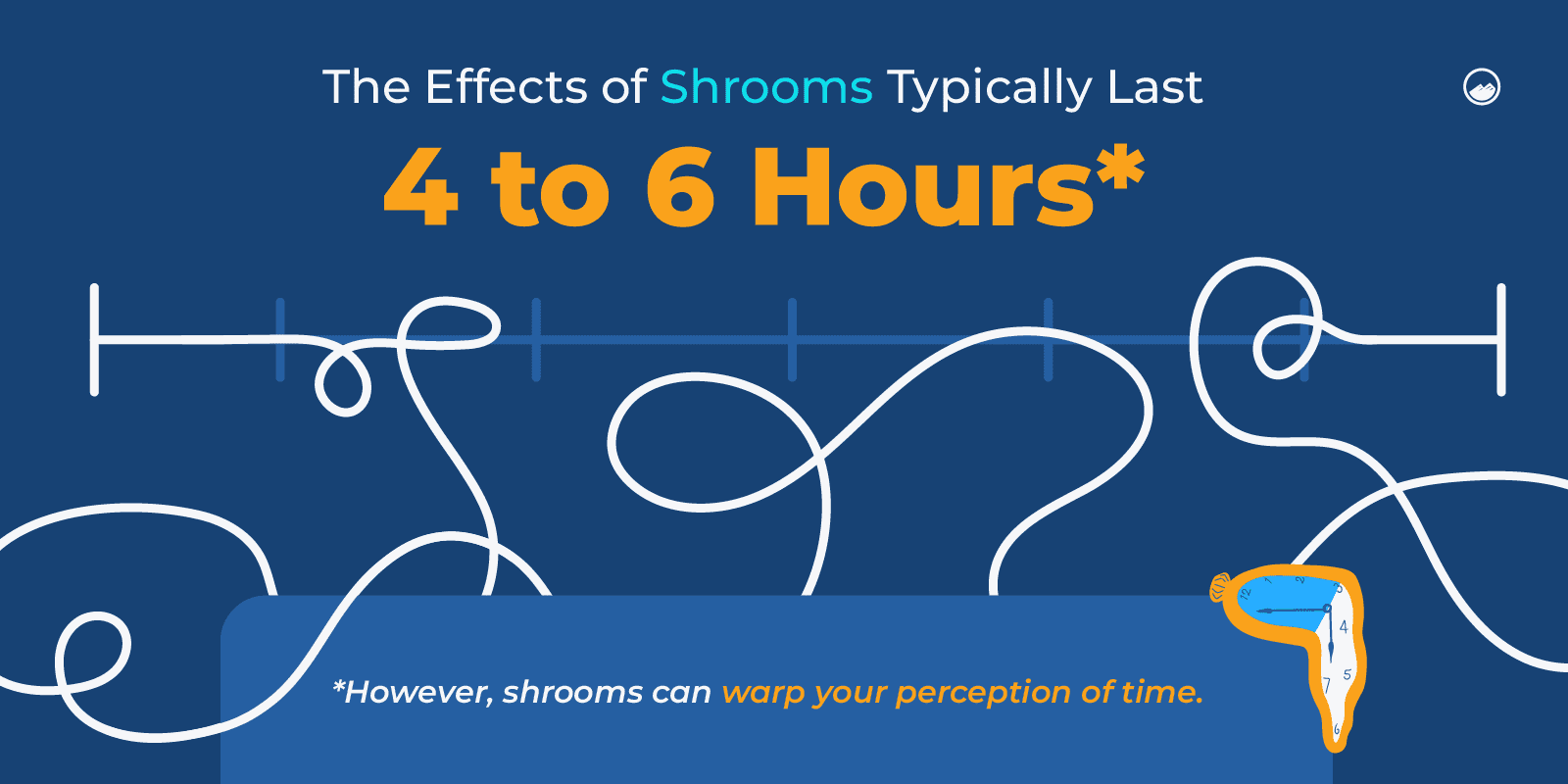
Because the psychedelic experience varies so differently from person to person, some may have bad experiences and face negative side effects while others may not. These effects can become dangerous, so it is important to understand the potential risks of psychedelic use.
Do People React the Same When Taking Shrooms?
Not all people react the same when taking shrooms.
Taking shrooms can be very unpredictable and depend on several factors, such as a person’s weight, age, the number of shrooms taken, what type is taken, and if they have taken them before, among many other factors.
What Is a Bad Trip?
A bad trip is a negative experience that can occur after taking a drug, most commonly psychedelics like LSD or magic mushrooms.
Anyone who uses psychedelics is at risk of experiencing a bad trip. However, certain factors may increase the risk of a person experiencing a bad trip which can include:
- Taking a high dose of a psychedelic
- Being in a setting with high stimulation
- Being in a negative emotional state before or after drug use
- Mixing psychedelics with other substances
- Not being hydrated
Common symptoms of a “bad trip” can include:
- Altered perception of time or feeling that time is standing still
- Paranoia
- Extreme mood swings
- Negative thoughts about people or the environment around you
- Negative hallucinations
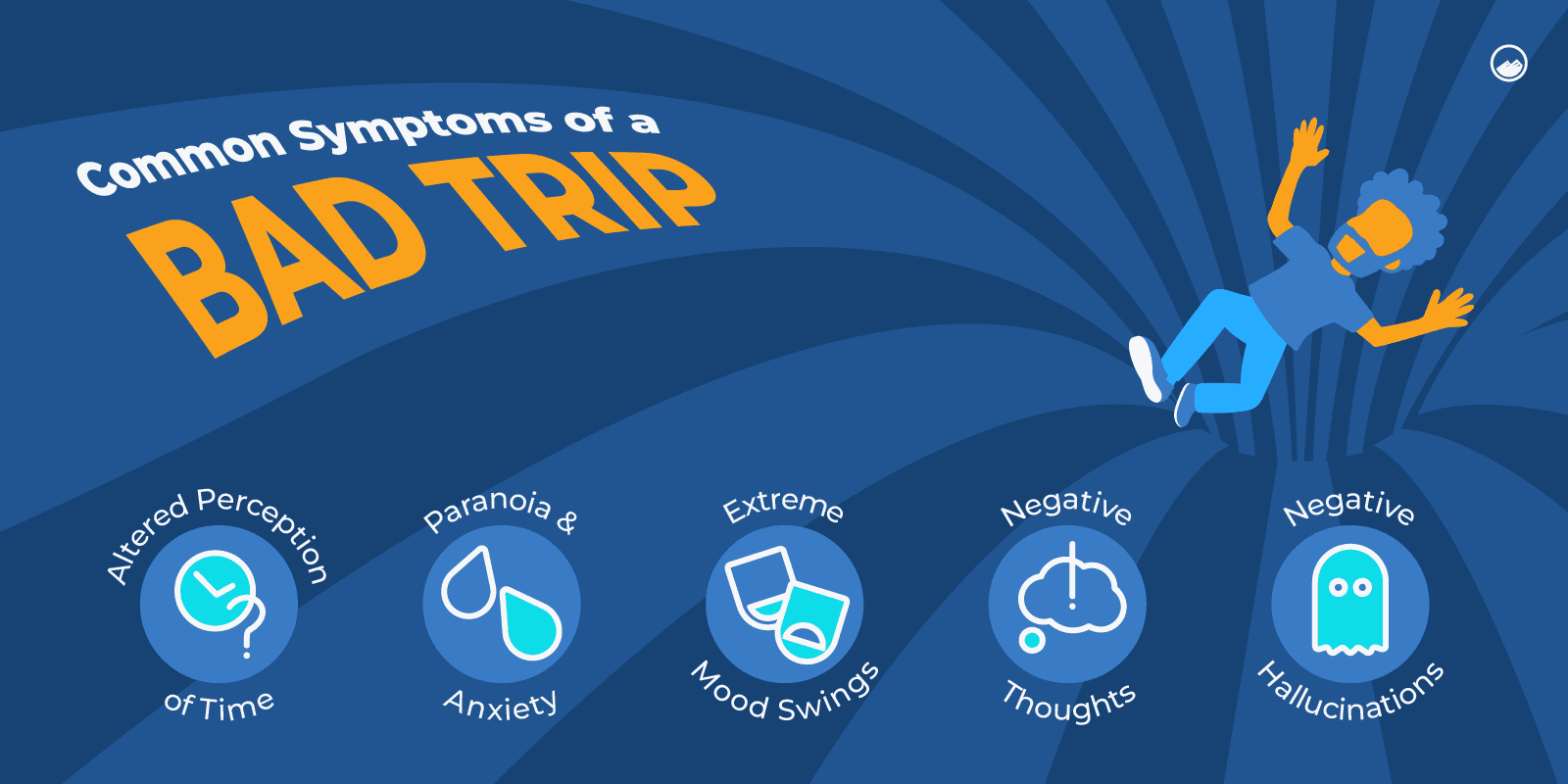
If a person is experiencing a bad trip, there are ways you can help them.
You can try to get them in a calm environment and move them away from overstimulation. It often helps that they have someone with whom they feel comfortable, but in some cases, a person can become paranoid or aggressive toward other people.
In serious cases, if you or someone else is in danger, you should get them medical help and call 911.
What Are The Symptoms of an Overdose on Mushrooms?
Symptoms of an overdose on mushrooms can include:
- Nausea and vomiting
- Anxiety
- Dizziness
- Excessive sweating
- Paranoia
- Confusion
- Psychosis
- Seizures
- Coma
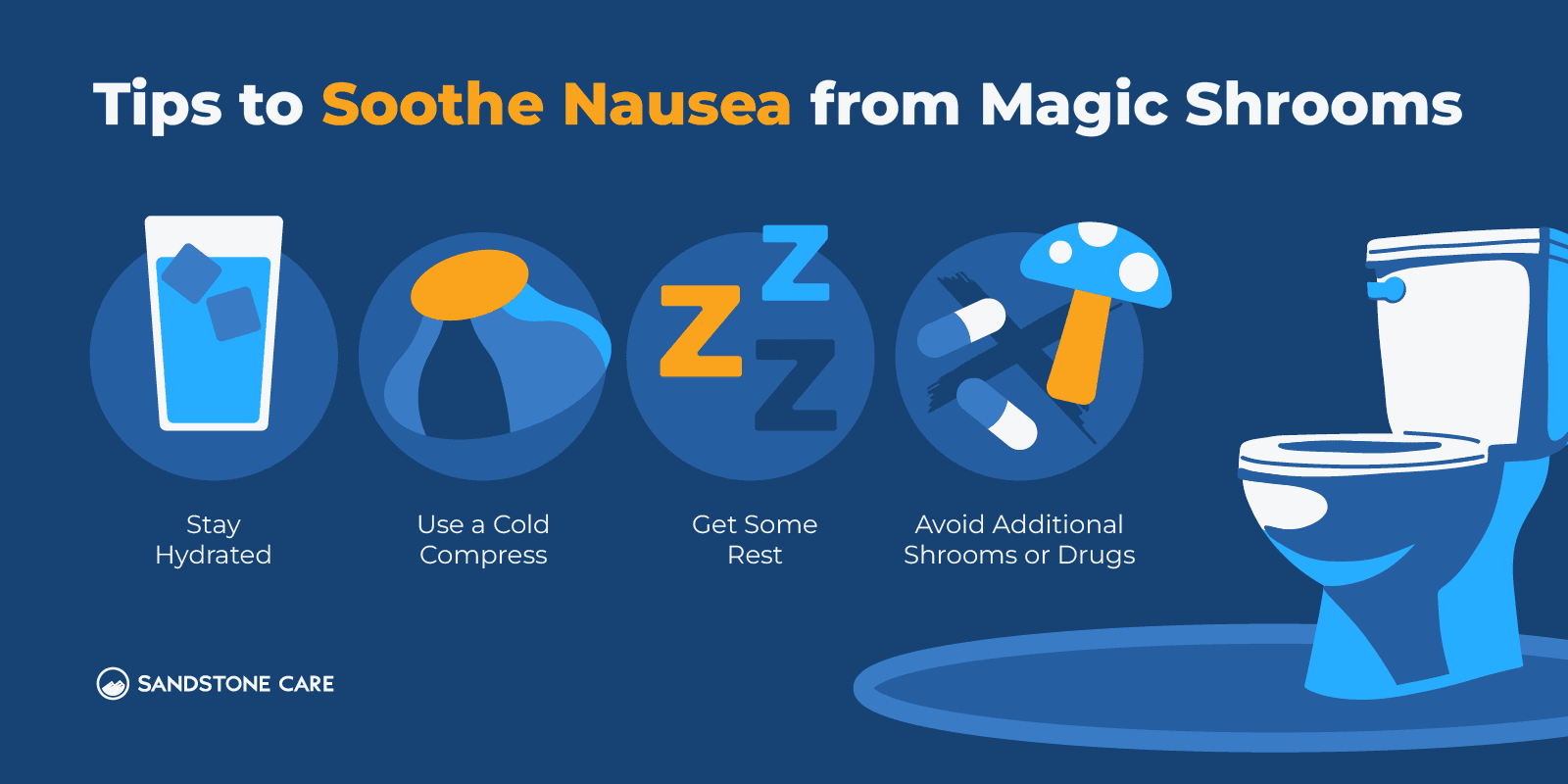
Magic Mushroom Treatment
What Are the Signs You Need to Stop Using Shrooms?
Common signs a person should stop using shrooms can include:
- You need more and more of it to achieve the same effects
- Drug use has harmed your life, physical health, and mental health
- You experience negative symptoms when you stop using it
- You’ve lost interest in things you used to once love
- You are experiencing financial problems because of the money spent on obtaining the drug
Does the Brain Regenerate After Drug Use?
When drugs are used, especially over long periods, they can alter natural levels and functions in the brain.
However, the brain does have the ability to repair itself after drug use.
This can happen when a person stops using the drug and if they get help and receive proper treatment.
If a person continues to use a substance over a long period, it often just worsens matters and leads to more serious consequences.
For young people especially, their brains are vulnerable because they are still going through major development. This puts teens and young adults at risk of facing negative consequences that can come with substance use, even if it is just once.
How Long Does It Take For Brain Chemistry to Return to Normal?
The length of time it takes for the brain chemistry to return to normal depends on the individual and various factors.
Some people may experience changes within months, while others may not for years.
What Does It Feel Like to Come Down From a Trip?
What happens after a trip, also known as the “comedown,” is not often thought about when a person takes shrooms.
A “comedown” can last up to a couple of hours after your trip, and a person can also feel effects from shrooms that last long after they have taken it.
When a person comes down from a trip, they may still feel the effects of shrooms, but they are most likely less intense and vivid.
A person may also feel fatigued, as taking shrooms can take a lot of energy out of a person and make it hard to sleep.
Additionally, individuals may feel a change in their mood after a trip. A person may feel down, have a low mood, and have low energy.
Are There Benefits of Magic Mushrooms?
Psilocybin and magic mushrooms have been used historically in religious and spiritual ceremonies.
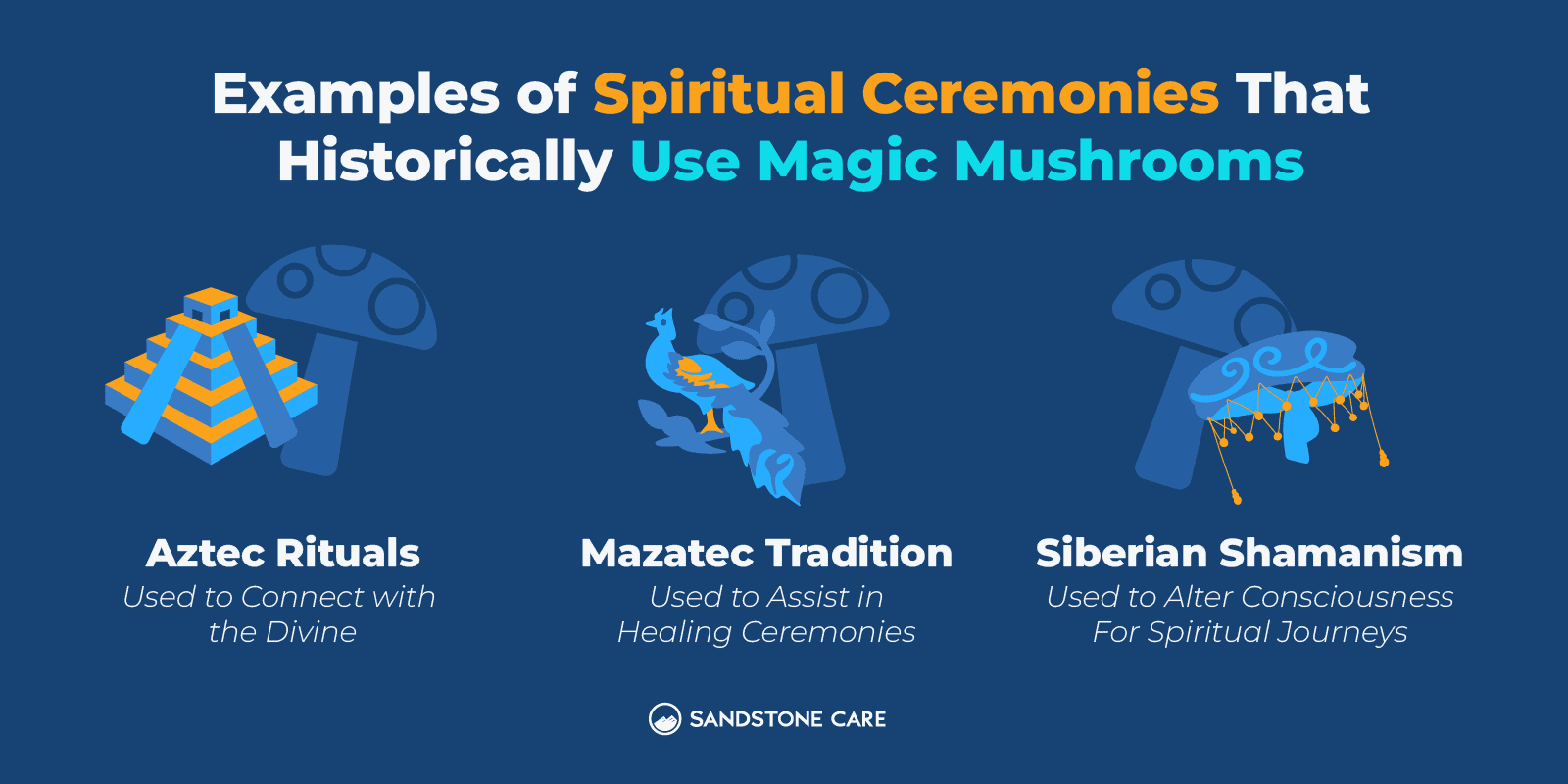
Studies have discussed the potential of magic mushrooms being used as therapy for neuropsychiatric conditions.
However, there have not been extensive clinical trials to confirm the benefits.
The psychoactive properties of magic mushrooms may show the potential to help with headaches, anxiety, treatment-resistant depression, and other conditions.
More data and research is needed to tell the future of the use of magic mushrooms for therapy and medical uses.
Do Psychedelics Help With Depression?
According to a study by the World Journal of Psychiatry, there is increasing evidence that psychedelics can aid in long-term antidepressant effects.
However, further research is needed to determine the safety and efficacy of the use of psychedelics for depression.
Currently, psilocybin is not recognized by the FDA as a safe option for depression treatment.
Do Mushrooms Help With Anxiety?
Some studies suggest that mushrooms may be effective in managing and alleviating symptoms of anxiety.
Do Mushrooms Help Your Brain?
There are growing conversations about whether or not mushrooms can help the brain.
More and more studies are taking place to help determine the safety and efficacy of mushrooms for therapeutic uses.
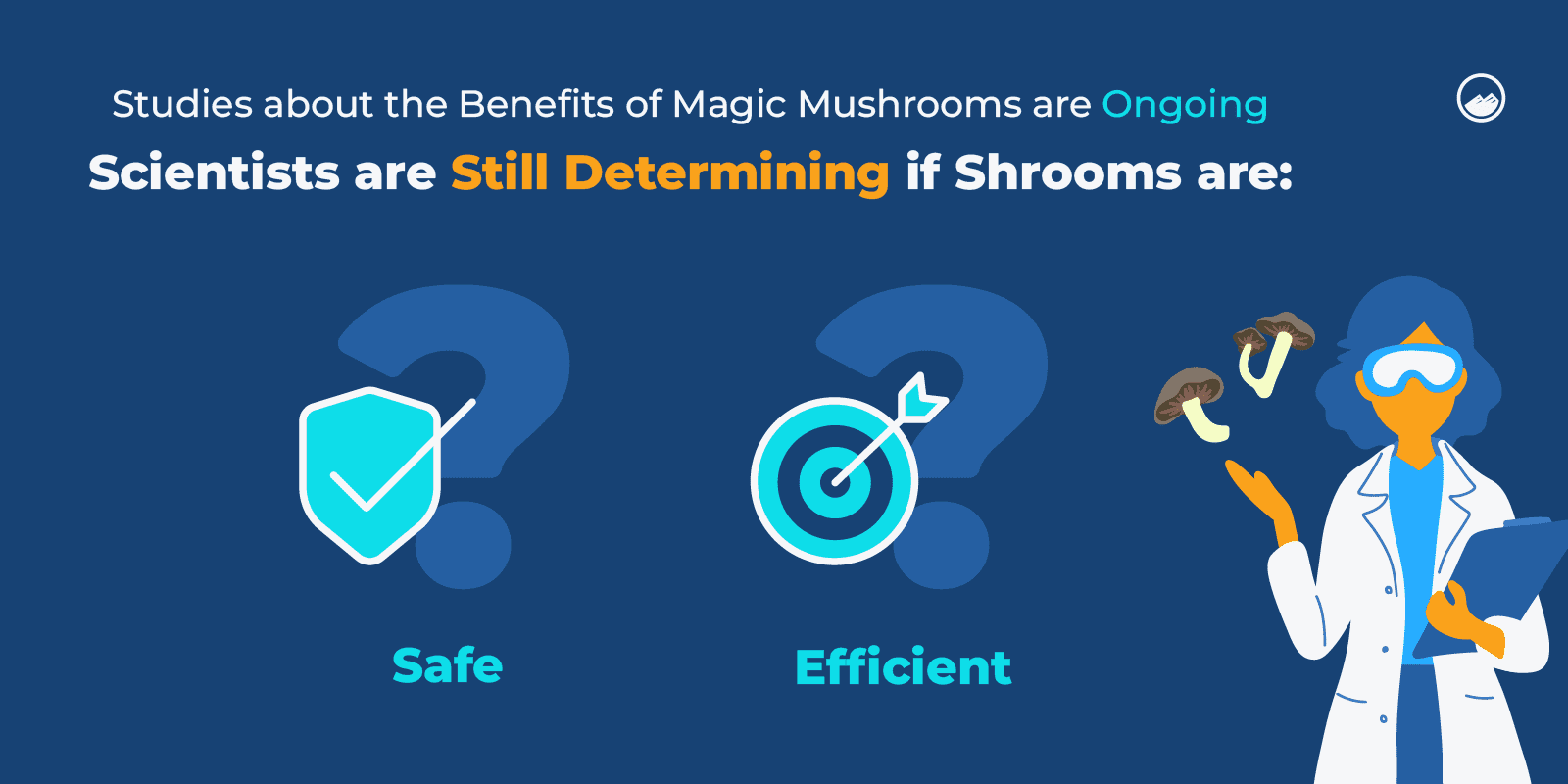
Can Mushrooms Treat PTSD?
There has also been discussion surrounding the potential of using mushrooms in combination with psychotherapy to help improve symptoms of PTSD.
Using mushrooms in the treatment of PTSD requires more understanding and better knowledge to determine the future of psilocybin therapy.
Can Psychedelics Heal Brain Trauma?
According to a study from Frontiers in Neurology, psychedelics can have a future in brain injury treatment.
Further studies can help researchers understand the potential of psychedelics in the treatment of PTSD and traumatic brain injuries (TBIs).
FAQ
You Have Questions, We Have Answers.
Our goal is to provide the most helpful information. Please reach out to us if you have any additional questions. We are here to help in any way we can.
Psychedelics are still illegal in the United States; however, more states are moving towards the decriminalization of psychedelics.
Hallucinogens are defined by the National Institutes of Health as a group of drugs that alter a person’s awareness of their surroundings and their thoughts and feelings.
Psychedelics are a type of hallucinogen that alter a person’s perceptions and mood and can affect a variety of cognitive processes.
Psilocin is psilocybin’s active metabolite.
Psilocin and psilocybin are structurally related to the neurotransmitter serotonin but are not the same thing.
The psychedelic effects of magic mushrooms are believed to come from the stimulation of serotonin 2A receptors by psilocin.
Yes, magic mushrooms are mushrooms that contain psilocybin, both a psychoactive and a hallucinogenic compound.
A person who takes psychedelics often sees visual hallucinations.
The types of things a person sees can vary from tunnels, spirals, honeycombs, and cobwebs.
Many people experience these geometric visual hallucinations, which can cause a person to see more edges, surfaces, and textures.
Data suggests that psilocin, the active metabolite in psilocybin, increases extracellular dopamine.


Let’s Take the Next Steps Together
It is important for people to understand the risks that may come with magic mushroom use. Sandstone Care is here to support teens and young adults with mental health and substance use disorders.

